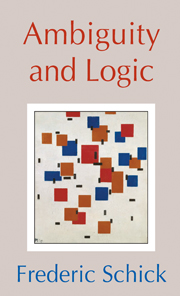6 - The Logic of Ambiguity
Published online by Cambridge University Press: 10 November 2009
Summary
WE will start with the mother topic, with the logic of thought. That is not the logic of truth; it isn't about validity and about what follows from what. It has to do with what a person ought to believe or not to believe, or with what he ought (or oughtn't) to believe if he believes certain other matters. Also with what he ought to want or not to want. … Most broadly: with what propositional attitudes he ought to hold or not to hold, or to hold or not hold in certain contexts of others.
First, about belief. There are said to be some people who believe nothing whatever. No logical fault in being a skeptic. We may think such people foolish, or excessively cautious, but we can't call them illogical.
Suppose that Jack is a skeptic, that
Jack believes nothing
problem there. But suppose too he believes he is a skeptic, that he believes (1), that
B(1)
follows (by the usual logic of truth) that
Jack believes something from (2)1
contradicts (1), and so, by reductio, it follows that
∼(1 · 2) and also
(2)⊃ ∼(1) which says that
B ⊃ ∼(1)
is a skeptic; nothing wrong there. But if he believes he is a skeptic, what he believes can be shown to be false (as in (6)). If we describe a belief as false where it focuses on a false proposition, Jack's belief then makes itself false. In that sense, it undermines itself, and there is something wrong in that.
- Type
- Chapter
- Information
- Ambiguity and Logic , pp. 97 - 116Publisher: Cambridge University PressPrint publication year: 2003



